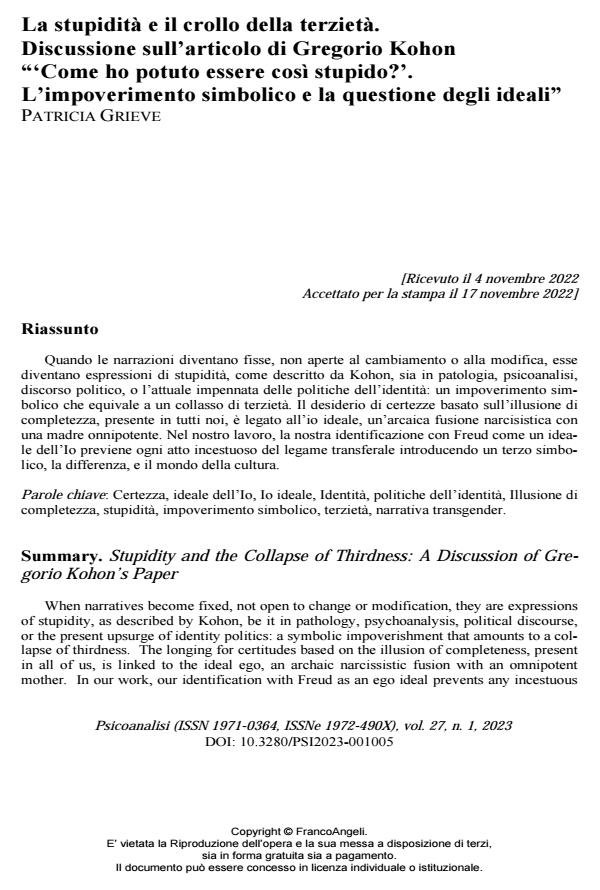Stupidity and the Collapse of Thirdness: A Discussion of Gregorio Kohon’s Paper
Journal title PSICOANALISI
Author/s Patricia Grieve
Publishing Year 2023 Issue 2023/1
Language Italian Pages 6 P. 77-82 File size 129 KB
DOI 10.3280/PSI2023-001005
DOI is like a bar code for intellectual property: to have more infomation
click here
Below, you can see the article first page
If you want to buy this article in PDF format, you can do it, following the instructions to buy download credits

FrancoAngeli is member of Publishers International Linking Association, Inc (PILA), a not-for-profit association which run the CrossRef service enabling links to and from online scholarly content.
When narratives become fixed, not open to change or modification, they are expressions of stupidity, as described by Kohon, be it in pathology, psychoanalysis, political discourse, or the present upsurge of identity politics: a symbolic impoverishment that amounts to a collapse of thirdness. The longing for certitudes based on the illusion of completeness, present in all of us, is linked to the ideal ego, an archaic narcissistic fusion with an omnipotent mother. In our work, our identification with Freud as an ego ideal prevents any incestuous acting out of the transferential bond by introducing a symbolic third, difference, and the world of culture.
Keywords: Certainty, Ego ideal, ideal ego, identity, identity politics, illusion of completeness, stupidity, symbolic impoverishment, thirdness, transgender narrative.
- Abella A. (2021). Fundamentalism: The Analyst Facing Reality. Psycho-Analysis in Europe. Bulletin, 75, 2021.
- Bollas C. (2015). Psychoanalysis in the Age of Bewilderement.: On the Return of the Oppressed. International Journal of Psychoanalysis, 96: 535-551. DOI: 10.1111/1745-8315.12352
- Bonhoeffer D. (1943). “After Ten Years”. Letters and Papers from Prison. New York: The Macmillan Company, 1971.
- Cahn R. (1998). The Process of Becoming-a-Subject in Adolescence. In: Ladame F., Perret-Catipovic M. (1998). Adolescence and Psychoanalysis. The Story and the History. London: Karnac Books.
- Freud S. (1908). Analyse der Phobie eines fünfjährigen Knaben (trad. it. Analisi della fobia di un bambino di cinque anni. (Caso clinico del piccolo Hans). In: OSF, vol. 5. Torino: Boringhieri, 1972.
- Kohon G. (1999). No Lost Certainties to Be Recovered. London: Karnac Books.
- Kohon G. (2019). Concerning the Nature of Psychoanalysis. The Persistence of a Paradoxical Discourse. Abingdon, Oxon & New York: Routledge.
- Kohon G. (2022). “How could I have been so stupid?”. Paper presented at the EPF Congress on Ideals. Vienna.
- Ladame F., Perret-Catipovic M. (1998). Adolescence and Psychoanalysis. The Story and the History. London: Karnac Books.
- Musil R. (1937). On stupidity. In: Precision and Soul: Essays and Addresses. Chicago: University of Chicago Press (trad. it. in https://www.storiologia.it/musil/musil02.htm).
Patricia Grieve, La stupidità e il crollo della terzietà. Discussione sull’articolo di Gregorio Kohon "‘Come ho potuto essere così stupido?’. L’impoverimento simbolico e la questione degli ideali" in "PSICOANALISI" 1/2023, pp 77-82, DOI: 10.3280/PSI2023-001005